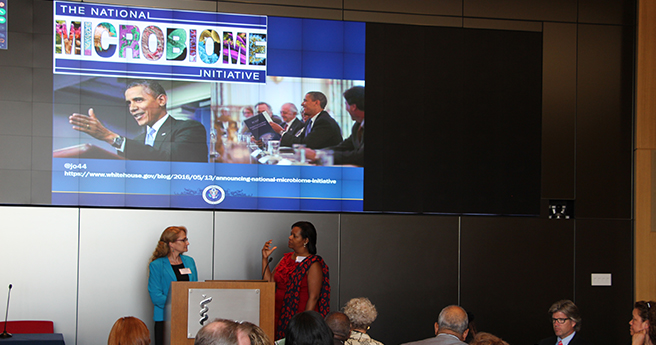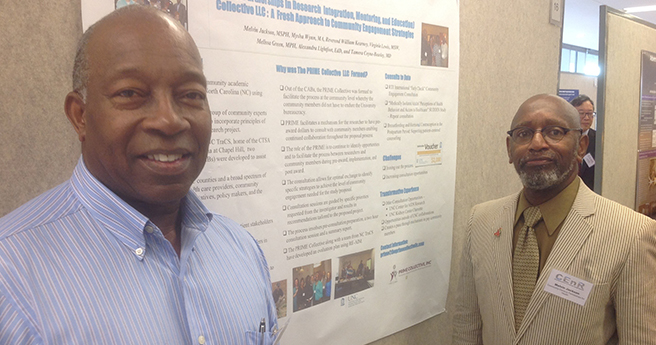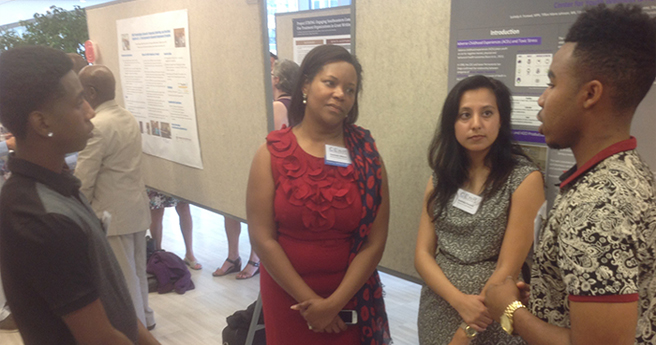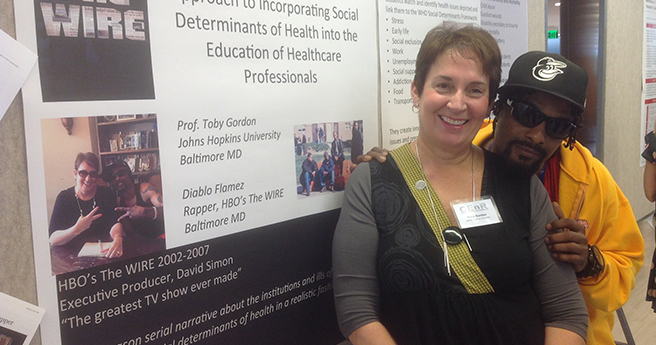
Photo by Matt Schorr
Meharry-Vanderbilt Alliance Executive Director Consuelo H. Wilkins, MD, MSCI (right) welcomes Jo Handelsman, PhD, Associate Director for Science at the White House Office of Science and Technology Policy (left) during a special session at the Advancing the Science of Community Engaged Research Conference. Additional photos can be viewed on the Meharry-Vanderbilt Alliance Facebook page.
WASHINGTON, D.C., During the past decade, community engaged research (CEnR) has emerged as an effective approach to accelerating clinical research and translating findings. Unfortunately, successful CEnR methods and best practices haven’t been disseminated at a pace consistent with the demands for community engagement.
The recent Advancing the Science of Community Engaged Research Conference in Washington, D.C., hosted by Vanderbilt University Medical Center and Meharry Medical College, sought to change that, offering both researchers and community stakeholders a forum to rapidly disseminate CEnR evidence and gain practical knowledge to implement new programs and enhance existing ones.
About 200 attendees convened at the Association of American Medical Colleges to advance knowledge of innovative CEnR methods and best practices. Consuelo H. Wilkins, MD, MSCI, who serves as Executive Director of the Meharry-Vanderbilt Alliance and chaired the conference organizing committee, said, “We have an urgent need for engaging communities in research, and we need to think broadly about how to meaningfully engage communities, individuals and patients.”
The trajectory of research, she added, can be changed for the better by actively engaging the community. “Our research outcomes must be relevant to communities,” she said.

Photo by Matt Schorr
Community advocate Rev. William Kearney (left) and Community-Campus Partnerships for Health representative Melvin Jackson, MSPH (right) discuss "The PRIME Collective" during a poster session at the Advancing the Science of Community Engaged Research Conference. Additional photos can be viewed on the Meharry-Vanderbilt Alliance Facebook page.
Rev. William Kearney a community advocate from Warrenton, North Carolina echoed that sentiment during the poster session. “I’m excited to be here, it’s my first conference,” he commented. “Being from the community, being involved with these researchers and academia has just made me feel that much more a part of the team.”
Kearney, alongside conference plenary speaker and Community-Campus Partnerships for Health representative Melvin Jackson, MSPH, presented a poster titled “The PRIME (Partnerships in Research Integration, Mentoring and Education) Collective: A Fresh Approach to Community Engagement Strategies.” They discussed the mission and goals of PRIME, which was formed to facilitate a collaborative process between universities and their surrounding communities.
Jackson, who spoke during the opening plenary session about the value of time and effort in community engagement, seconded Kearney’s thoughts: “I feel very pleased to see the number of community people that are here and how this work is moving forward.”

Photo by Matt Schorr
Pictured from left to right: Jaquez Donaldson; Consuelo H. Wilkins, MD, MSCI; Sukhdip Purewal; and Joseph Reagans. Donaldson and Reagans, both of the Center for Youth Wellness, discussed "Adverse Childhood Experiences Among Teenage Youth in San Francisco." Additional photos can be viewed on the Meharry-Vanderbilt Alliance Facebook page.
Other poster presenters included teens Joseph Reagans and Jaquez Donaldson of the Center for Youth Wellness, whose poster detailed “Adverse Childhood Experiences Among Teenage Youth in San Francisco.” Reagans said it was good to hear about different things happening in society.
“I get to hear about all these different things and how we can think of ways to change them,” Reagans said.
“I’m blessed to be here, to know that there are so many people that are trying to prepare a change in society like we are,” Donaldson added.
From start to finish, the conference covered a wide range of topics and issues. Speakers included President and CEO of the Genetic Alliance Sharon F. Terry, MA; Center for Participatory Research at the University of New Mexico Director Nina Wallerstein, DrPH; Center for Community Health Partnerships at the Medical University of South Carolina Director Carolyn Jenkins, DrPH, MSN; and Director of Community Engagement and Research at the University of Colorado-Denver Donald Nease, Jr., MD.
Gordon R. Bernard, MD, VUMC Executive Vice President for Research and Director of the Vanderbilt Institute for Clinical and Translational Research (VICTR), commented, “VICTR recognizes the value of engaging communities in research and has made long-term investments in our Community Engaged Research Core. We are pleased to support this conference and delighted that more than 60 institutions – including 41 CTSA Hubs – participated.”
Jo Handelsman, PhD, Associate Director for Science at the White House Office of Science and Technology Policy, presented during a special session where she spoke about the National Microbiome Initiative, which aims to advance understanding of microbiome behavior.
Ebony Boulware, MD, MPH, Professor and Chief of the Division of Internal Medicine and Vice Dean for Translational Science at Duke University School of Medicine, and also a plenary speaker for the conference, brought the microbiome discussion into the community sphere when she suggested that if researchers are studying the microbiome and PTSD related to gun violence, they must also consider the social aspects. There is a need, she said, to understand the biophysical aspects and interactions between communities and gun violence.
“I think what’s been most exciting about a conference like this one is that it’s not just about the research methodology, focusing on recruitment or designing a study,” Ben Nowell, PhD of the Global Health Living Foundation noted, “but it’s also about the social context in which research takes place.”

Photo by Matt Schorr
Toby Gordon, PhD, Associate Professor at Johns Hopkins University, and rap artist Diablo Flamez, presented "Teaching 'The Wire': A Novel Approach to Understanding Social Determinants of Health and Community-Based Programs." Additional photos can be viewed on the Meharry-Vanderbilt Alliance Facebook page.
The conference’s diversity and community focus also extended to the poster presentations, which included “Teaching ‘The Wire’: A Novel Approach to Understanding Social Determinants of Health and Community-Based Programs” by Toby Gordon, PhD, Associate Professor, Johns Hopkins University and rap artist Diablo Flamez, who contributed music for the HBO series “The Wire.” Gordon said she loved being in a place with people who shared her interests. “I’m excited about more that we can do after this,” she said.
Flamez added, “I like the questions. It’s very big. Everybody is deeper than you think when they open their mouths. You’re thinking it’s scholastic, but they’re spiritually involved, trying to help about what’s going on in the community. And I really love that.”
Charles P. Mouton, MD, MS, a Professor of Family and Community Medicine at Meharry Medical College who co-chaired the conference, commented, “We want to make sure that we are ready and energized, and make sure that all research in this country and the world remembers the community it’s designed to serve.”
About the Meharry-Vanderbilt Alliance
Founded in 1999, the Alliance bridges the institutions of Meharry Medical College and Vanderbilt University Medical Center. Its mission is to enrich learning and advance clinical research in three primary areas -- community engagement, interprofessional education and research -- by developing and supporting mutually beneficial partnerships between Meharry Medical College, Vanderbilt University Medical Center and the communities they serve. Through community engagement, the Alliance serves a large community of stakeholders including surrounding universities and colleges, community organizations, faith-based outlets and community health centers. Its interprofessional education enhances students' interdisciplinary understanding and improves patient outcomes through integrated care. The research conducted provides access to experienced grant writers and materials supporting the grant application process and facilitates grant-writing workshops.



